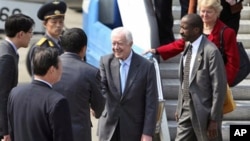The Korean peninsula this week is seeing an increased amount of diplomatic activity.
One of China’s senior diplomats, Wu Dawei, is back in Seoul. He is promoting a resumption of dialogue between the two Koreas as a prelude to again starting wider talks with four other nations aimed at getting Pyongyang to give up its nuclear weapons.
Beijing’s top nuclear negotiator began his discussions here hours after a high-profile international group of statesmen touched down in Pyongyang for a three-day visit. They are former U.S. president Jimmy Carter, Finland’s former president Martti Ahtisaari, the former prime minister of Norway, Gro Brundtland, and former Irish president Mary Robinson. They were greeted at the airport by North Korean Vice Foreign minister Ri Yong Ho.
South Korean Foreign Minister Kim Sung-hwan says he does not hold high expectations from the trip.
Kim says Seoul does not need the help of third parties to communicate with Pyongyang.
In Beijing, on Monday, Carter said the group hoped to meet North Korean leader Kim Jong-il and his son and heir apparent, Kim Jong Un.
The visiting quartet’s members said they want to discuss the stalled nuclear disarmament talks and learn about food shortages.
Many who are rallying in Seoul this week hope the high-profile visitors to Pyongyang will also raise the issue of human rights.
Thousands of South Koreans are participating in events marking North Korean Human Rights Week.
A rally was held at Seoul’s main train station, Tuesday.
Participants chanted in support of a human rights law regarding North Korea under discussion here. The proposal would further restrict humanitarian aid and set up a government office to examine the human rights situation in the North.
The demonstrators also demanded that Pyongyang abolish its prison camps, where they say North Koreans are being killed.
Woo Dae-sik, a member of the South Korean Veteran’s Association, says these matters need to be reflected in his government’s policies.
Woo says rallies such as this one do make a difference. And, that the issues have to be raised for the sake of Korean re-unification.
Multi-nation talks about North Korea’s nuclear disarmament have been stalled for nearly two-and-a-half years. Those discussions involve both Koreas, the United States, China, Japan and Russia.
Efforts to revive high-level talks between Seoul and Pyongyang have also been deadlocked. South Korea has repeatedly insisted North Korea must first apologize for the sinking of one of its coastal warships, last year. Forty-six South Korean sailors died.
North Korea has rejected the conclusion of an international investigation which blamed the ship’s explosion on a North Korean torpedo.
Inter-Korean relations went into an even deeper chill, five months ago, when the North shelled a frontier Yellow Sea island, killing four South Koreans.




